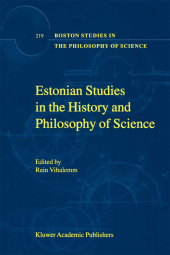 Neuerscheinungen 2012Stand: 2020-01-07 |
Schnellsuche
ISBN/Stichwort/Autor
|
Herderstraße 10
10625 Berlin
Tel.: 030 315 714 16
Fax 030 315 714 14
info@buchspektrum.de |

Rein Vihalemm
Estonian Studies in the History and Philosophy of Science
Herausgegeben von Vihalemm, Rein
2001. 2012. xiv, 306 S. XIV, 306 p. 241 mm
Verlag/Jahr: SPRINGER NETHERLANDS; SPRINGER, BERLIN 2012
ISBN: 9401038635 (9401038635)
Neue ISBN: 978-9401038638 (9789401038638)
Preis und Lieferzeit: Bitte klicken
The development of geography also forms an interesting chapter in the history of the University ofTartu and in that of Estonian science in general. On the one hand, geography is a natural science in the broader sense ofthe word, on the other hand it is a study of human activity. This status of geography makes it particularly sensitive to the cultural and political circumstances under which scholarship and science have developed in Estonia. The article by Professor of Human Geography Ott Kurs (born 1939) and historian of science (PhD in geography) Erki Tamrniksaar (born 1969) "In Political Draughts Between Science and the Humanities: Geography at the University ofTartu Between the th th 17 -20 Centuries" is devoted to this topic. Among other things, the article states that regular instruction in geography started at the University of Tartu in 1826, when the second chair of geography in Europe was established here. Although the present book does not contain any studies on philosophy at th Tartu University in the 19 century, I would still like to mention two names. th In the early 19 century, I. Kant´s philosophy was dominant at Tartu Uni versity. One of Kant´s pupils, Gottlob Benjamin Jasche (1762-1839), who had worked under him as a Privatdozent in Konigsberg, served as a professor here from 1802-1839. In the history of philosophy he is primarily known as the publisher of Kant´s Logic.
Introduction: Estonian Science Studies; R. Vihalemm. Part I: Studies in the History and Policy of Science in Estonia. Newton´s Principia in the Curricula of the University of Tartu (Dorpat) in the Early 1690-s; Ü. Lumiste, H. Piirimäe. A University Between Two Cultures: On the Development of Tartu/Dorpat University in the 19th and Early 20th Centuries; H. Tankler. The Emergence of Physical Chemistry: The Contribution of the University of Tartu; V. Past. In Political Draughts Between Science and the Humanities: Geography at the University of Tartu Between the 17th-20th Centuries; O. Kurs, E. Tammiksaar. Formation of R&D Policy in a Small Country in a Changing World; H. Martinson. Science and Society - Faculties Close or Apart?; J. Engelbrecht. Part II: Studies in the General Methodology, History and Philosophy of Science. Some Fundamental Criteria of the Scientific Method and the Internal Structure of Science; V. Palm. The Glory and Misery of Modern Science; U. Uus. Edmund Husserl Pursuing the Paths of Descartes: The Paris Lectures on Philosophy as a Universal Science; Ü. Matjus. Herman Boerhaave - Communis Europae Praeceptor: Internal vs. External in the History of Science; E. Lähkivi. The Problem of the Relationship Between Human and Physical Realities in Ilya Prigogine´s Paradigm of Self-Organisation; L. Näpinen. Science and Magic: Causality; P. Müürsepp. Symmetry and Rationality; J. Tammaru. Chemistry as an Interesting Subject for the Philosophy of Science; R. Vihalemm. Part II: Studies in the Philosophy of Physics. Physical Reality, Theoretical Physics, and Mathematics; P. Kuusk. Outsolutions in Physical Theories. PhysicalConsiderations; J. Eintalu. What is Time?; M. Kõiv, P. Kuusk. The Copenhagen Interpretation of Quantum Mechanics and Common Sense; A. Unt. Part IV: Studies in the Methodology and Philosophy of Special Fields of Research. Knowledge, Human Interests and Migration Studies; H. Kulu. Value-Neutral Paternalism; V. Parve. Inter-Level Explanation and the Category-Mistake; B. Mölder. On the Raising of a Hand; J. Kivistik.


